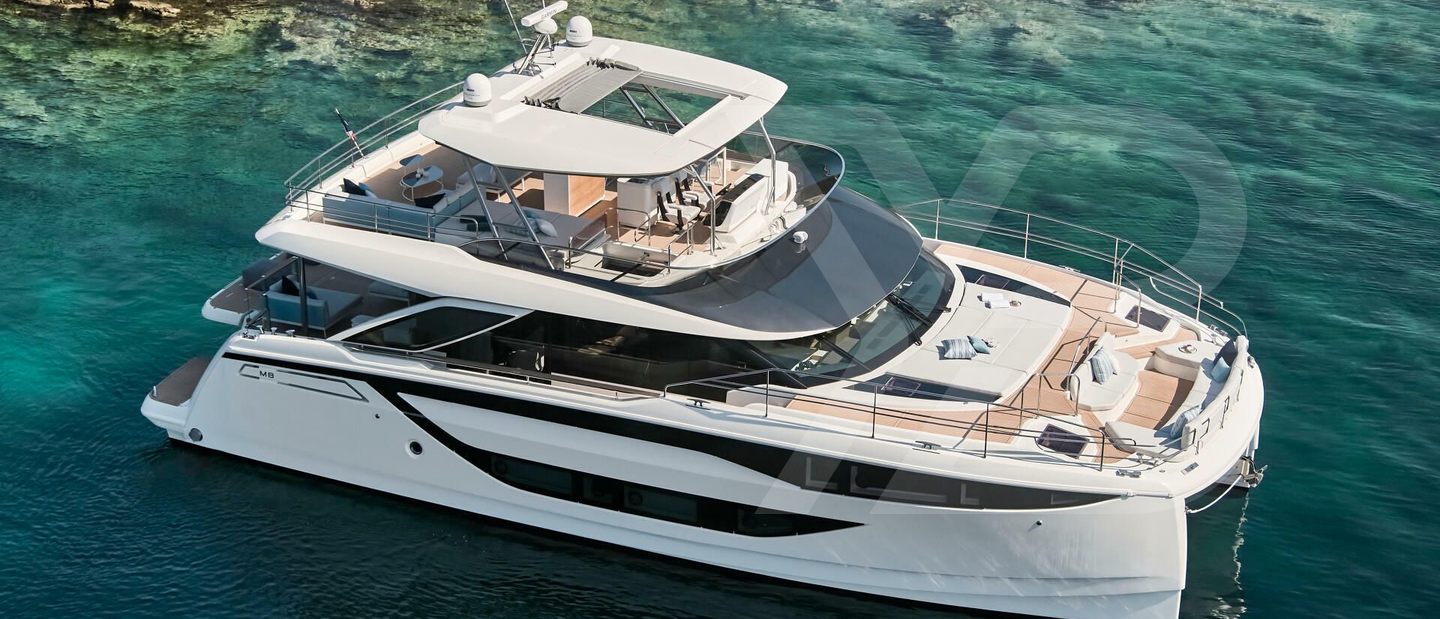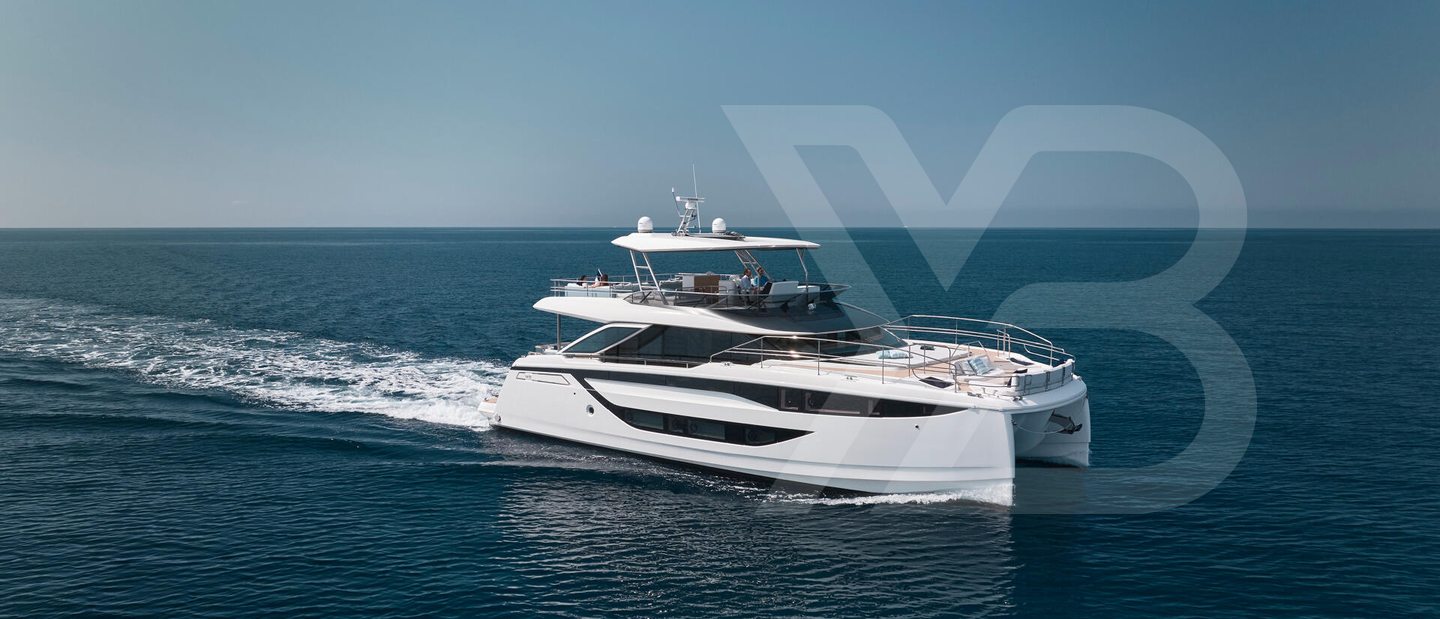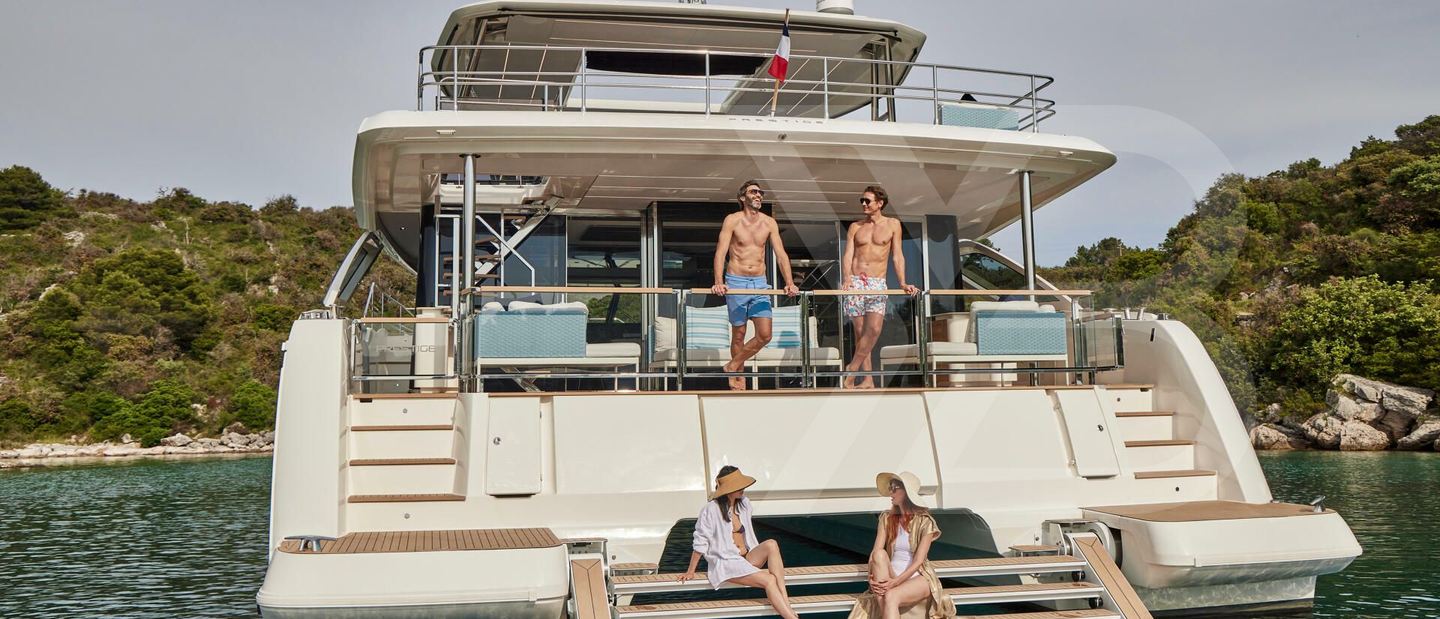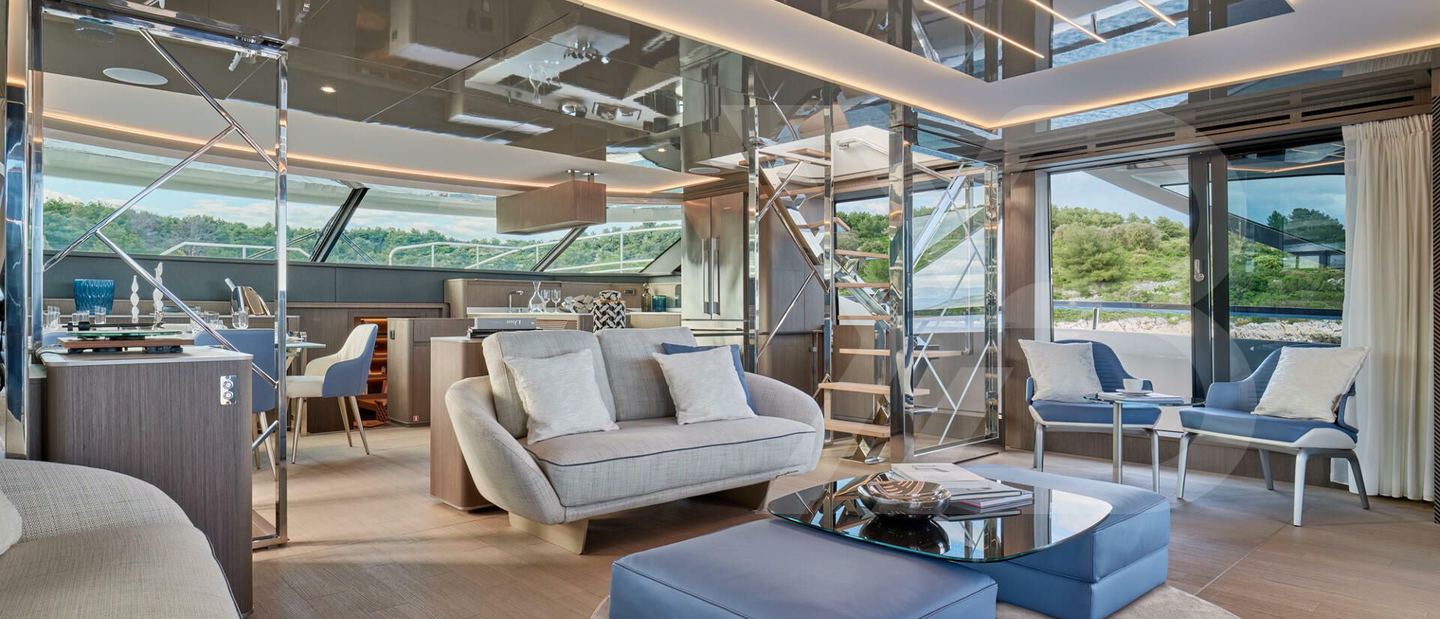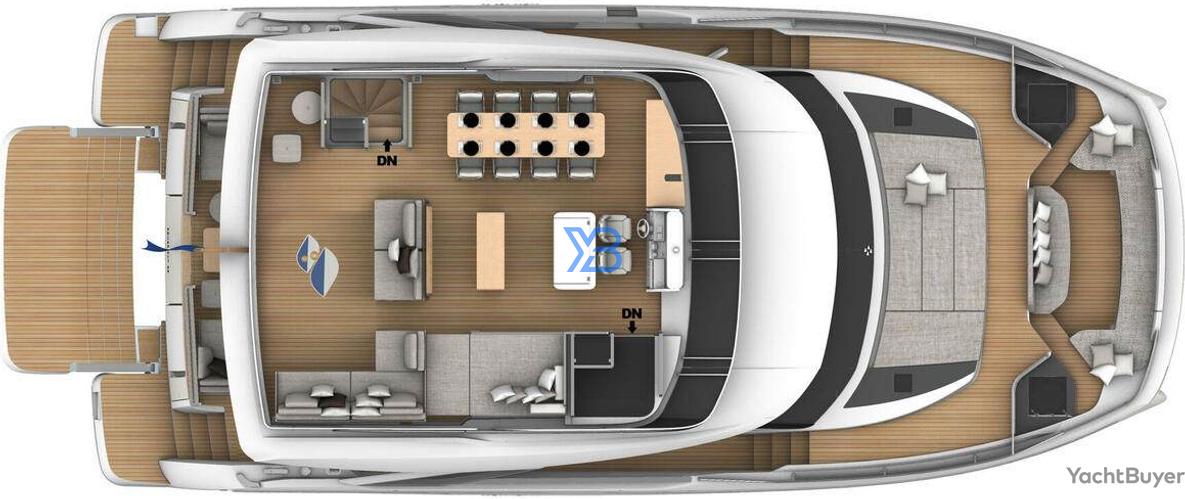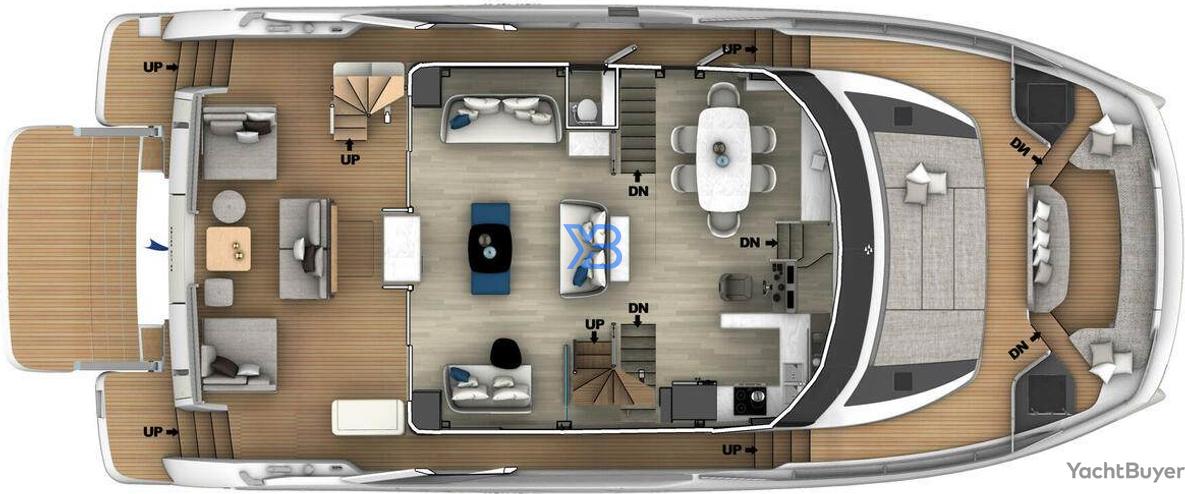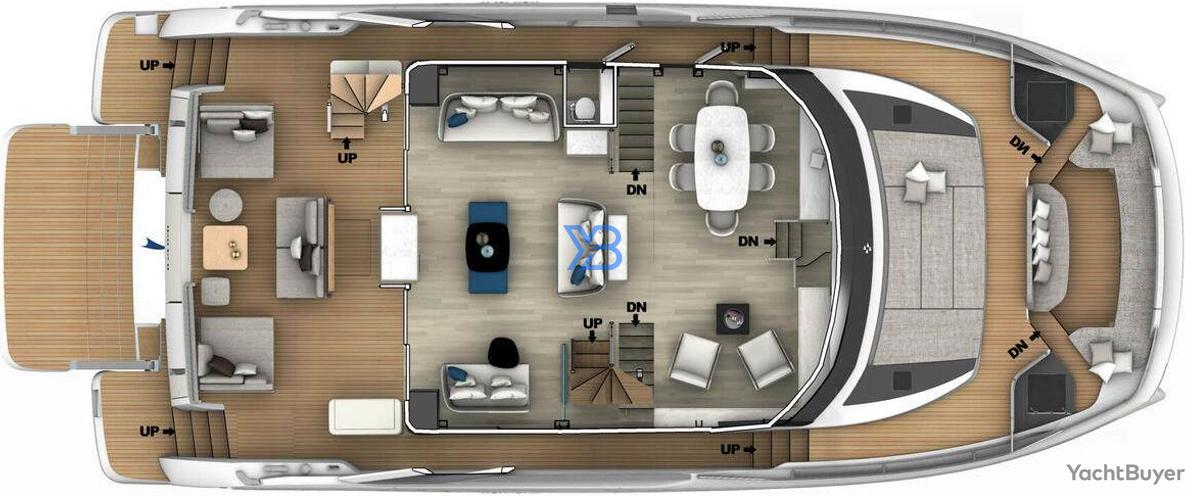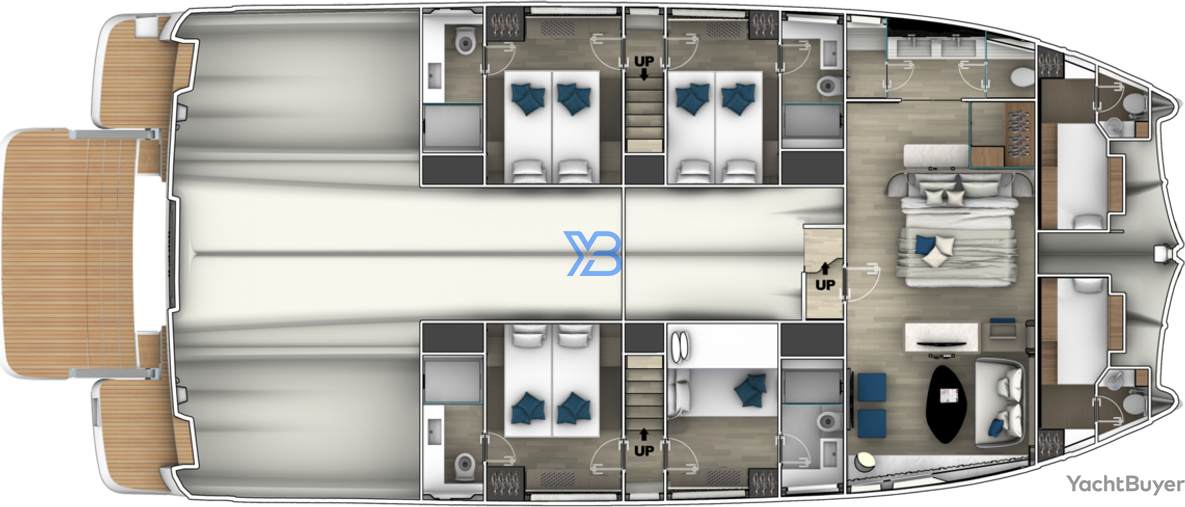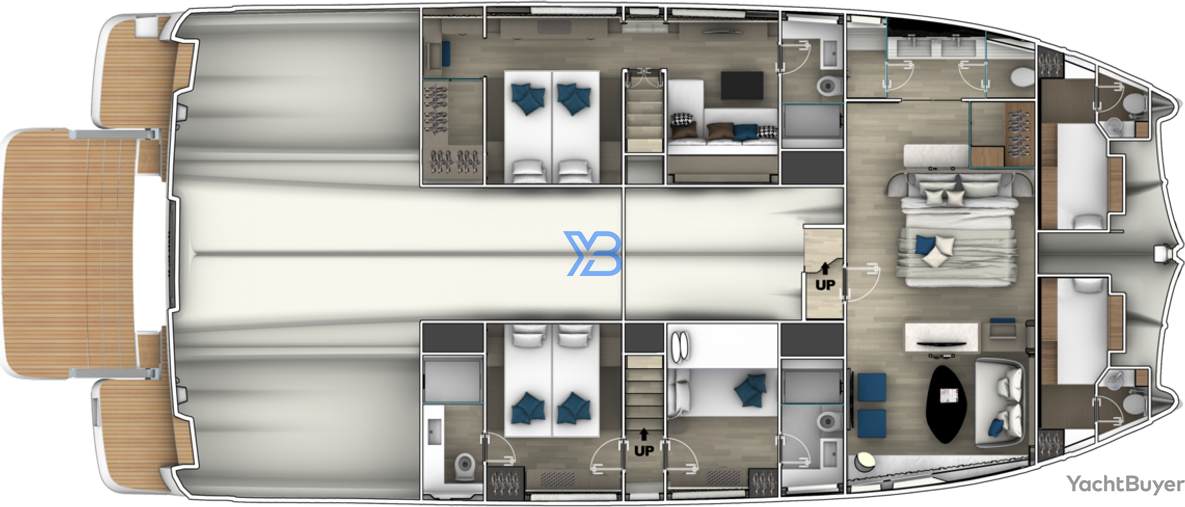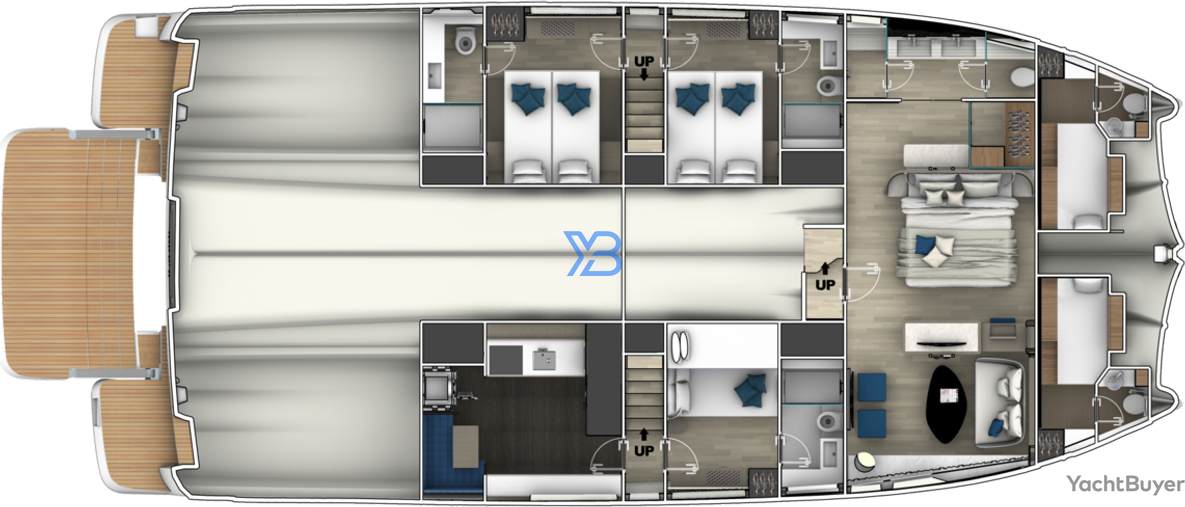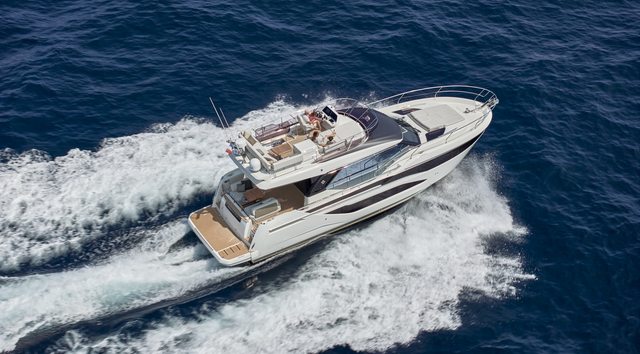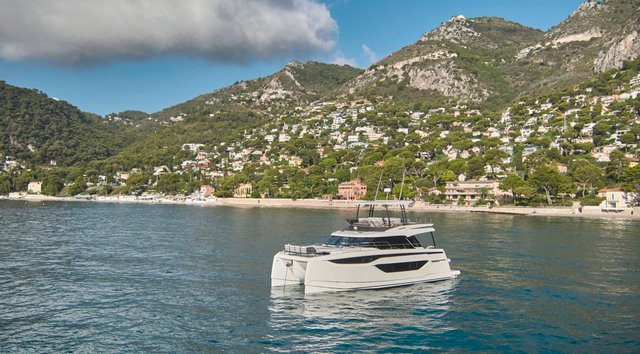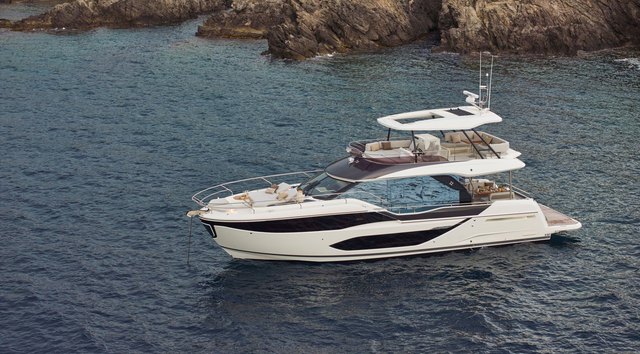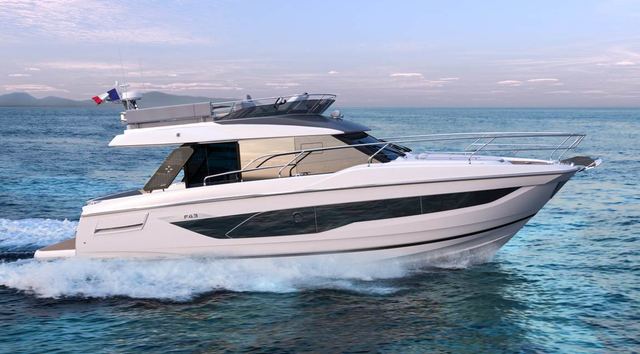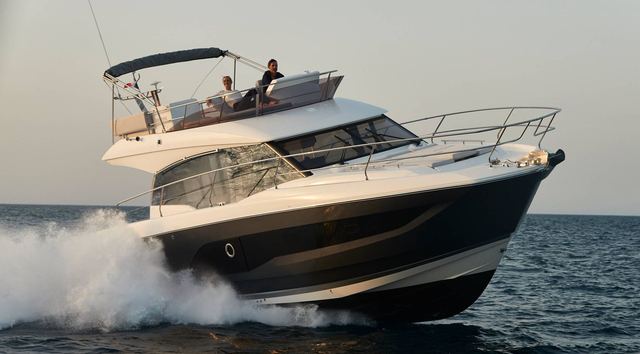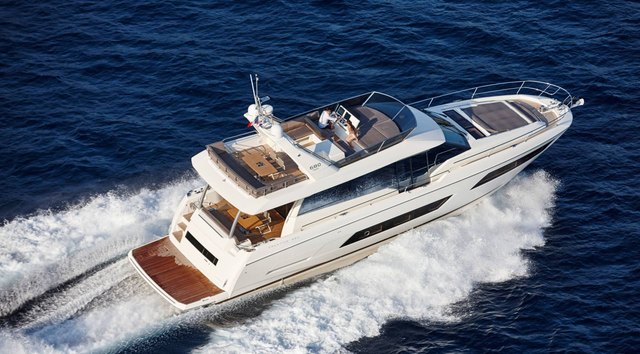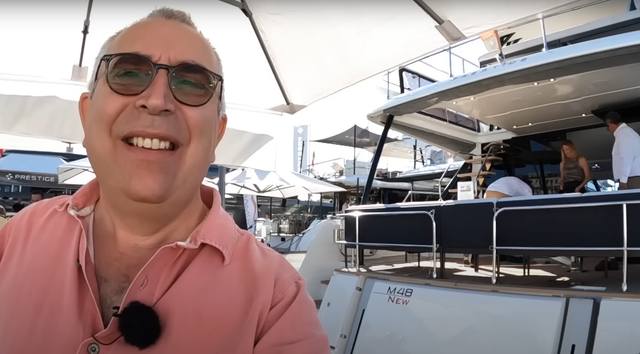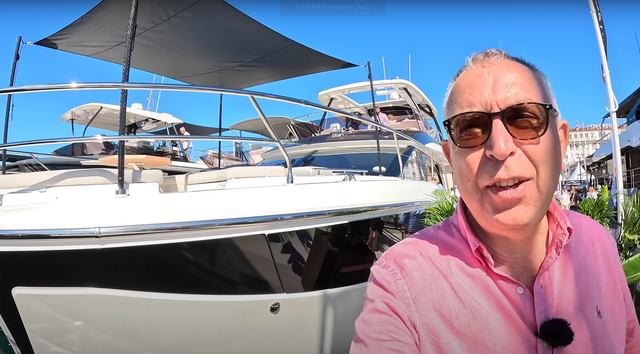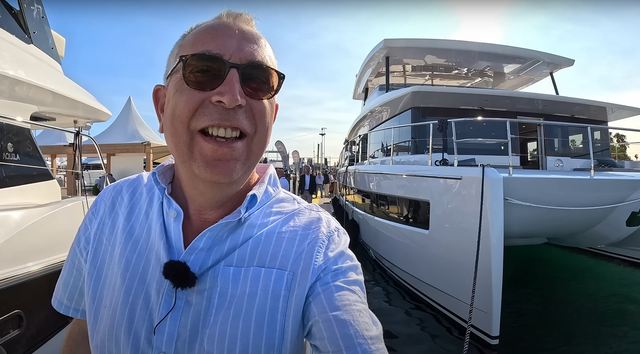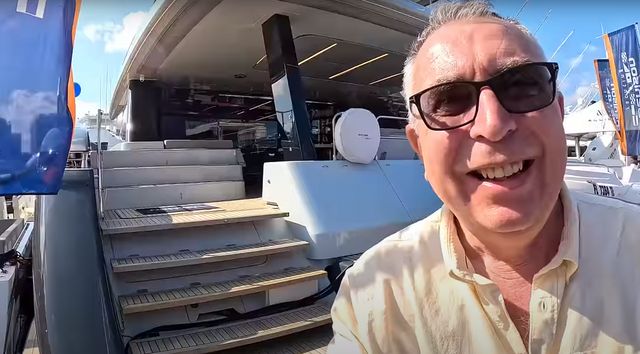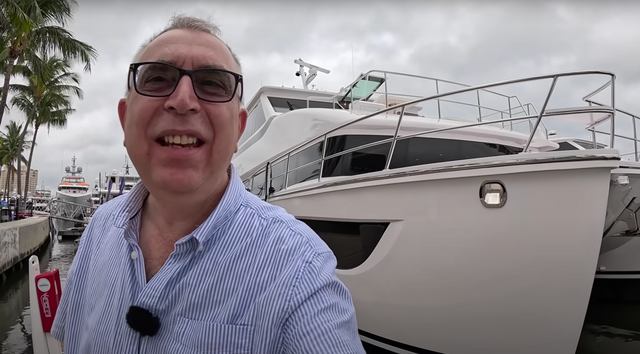Does size really matter? It does so aboard a power catamaran. The M8 is 1.5m (5ft) shorter than the 21.3m (70ft) Prestige 690 flybridge but it's almost twice as wide and that makes a difference.
Its deck spaces are sprawling, storage is outstanding, the saloon is huge and the owner's cabin is so large Prestige refers to it as the 'owner's apartment'. The name? It refers to Prestige's belief that the M8 has the same volume as a 24-27m (80-90ft) monohull. Big boat space means big boat pricing, though, with prices starting from €4,750,000 ex VAT (correct at the time of writing). Big money for a Beneteau Group product, but is it justified?
Test & Review Video
Around the Marina
The modern world of boat control has taken a lot of the fear out of handling big power cats at slow speeds. This used to be a hurdle for many buyers as the idea of manoeuvring something so wide around a tight marina wasn't all that appealing but thruster, joystick, and camera technology have changed the game here. The M8 we tested - hull number one - was fitted with all three plus an extra joystick in the cockpit so whatever the type of mooring it was easy to find a place to control the boat from.
The cockpit joystick is a €14,000 option. Still, the joystick at the helm and twin proportional bow thrusters come as standard, a sensible move by Prestige that takes much of the intimidation out of threading the 9.1m (30ft) wide M8 around a marina. The freeboard is high but the superstructure isn't so she doesn't have much windage and the twin hulls keep the boat nicely planted on the spot and not overly affected by wind or tide.
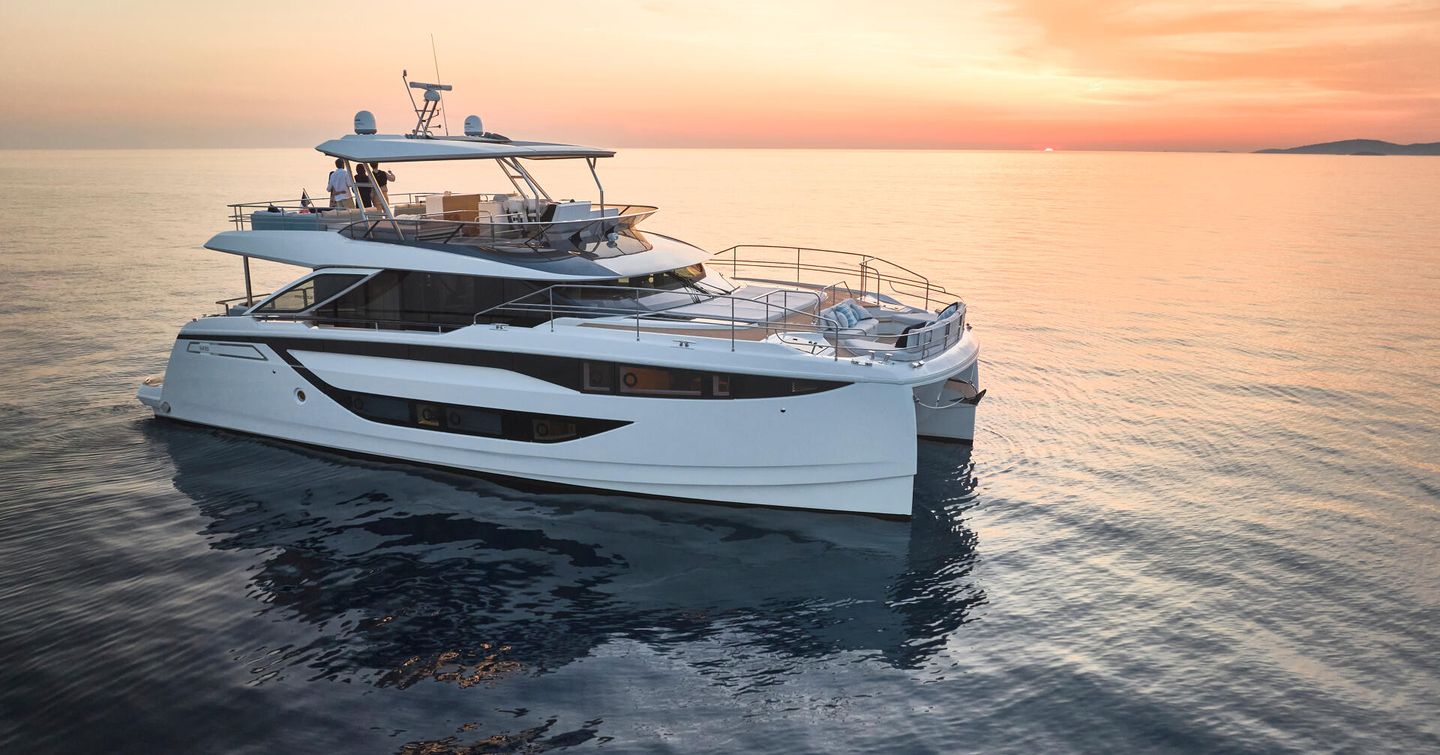
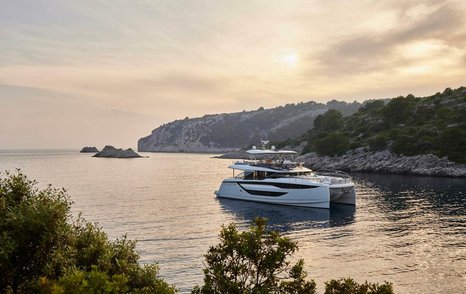
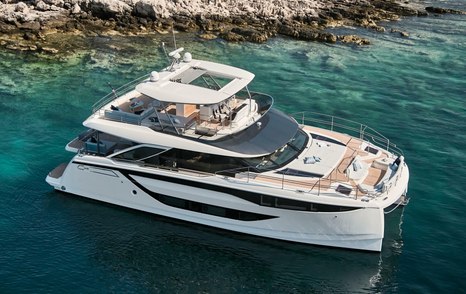
You can't physically see the aft end of the boat from the flybridge helm, though you can with the cameras, so when mooring stern-to it makes sense to get as close to the berth as possible at the upper helm and then transfer to the cockpit station for the final few meters. There are a couple of options when it comes to the lower helm, which we'll cover later on.
Crewing onboard the boat couldn't be easier, the side decks are large and well-protected with chunky guardrails all around. The thick, squared-off rails at the aft end of the decks look and feel great but they do make tying fenders a little more difficult - there are no such issues up front, though. There is plenty of space to stow fenders on deck, too, and boarding gates make accessing the boat from a high quay or fuel dock that bit easier. The freeboard is massive, though, and it's almost impossible to reach the amidships cleats from the pontoon, so most of the line handling will have to be done from onboard the boat.
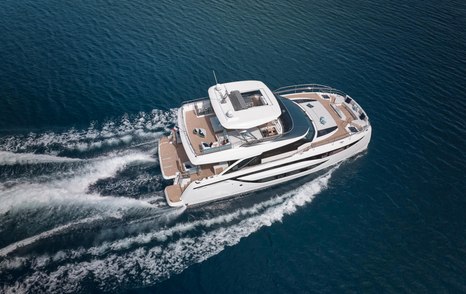
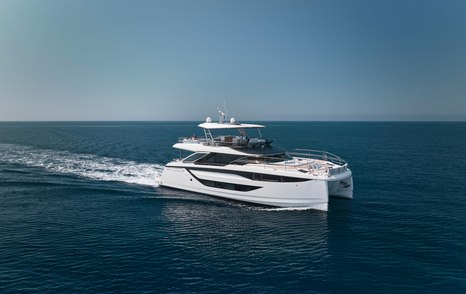
At Sea
There is only one engine option on offer and that's a pair of Volvo Penta D8 600hp motors connected to V-drive shafts. That's a relatively small amount of horsepower for such a large vessel but this is a boat designed to sit at 15 knots and slower so the idea of trying to hit anywhere near 30 knots isn't even in the equation. Frankly, from 6 knots to 21 knots the boat barely changes running angle at all, the only difference being how much breeze is pouring over your head.
It stays resolutely flat throughout the rev range and it's the same story when you dial in a bit of lock through the fly-by-wire steering. Those slender hulls offer plenty of grip and the M8 swings around surprisingly neatly for such a wide boat of well over 40 tonnes but it's not what you'd call a thrilling driving experience. But then it's not supposed to be. Set it at about 2,500rpm for roughly 15 knots and you're away. Here she'll plod along, sipping away at the 3,700-litre fuel capacity for 350nm between fills. Not earth-shattering range for this style of boat - to get the range over 1,000nm you'll need to be below 10 knots - but then this is no Nordhavn rival. It's a big leisure cat with spaces to be enjoyed at rest and on the move.
As you might expect of something this wide and heavy, it tracks perfectly straight and needs very little input from the helm to maintain a steady heading. We had no real chop to contend with during our trial but crossing wake head-on, those slim hulls slice through in blade-like fashion. Beam-on swell at slow speed did tend to provoke more of a rocking motion than you'd expect from a stabilised monohull but with water running under the hulls, the M8 is an immensely stable platform.
This builds into the way you can use the boat, too. The journey becomes as much of the experience as the destination because guests can move around the boat safely and enjoy all of its various living spaces on the move. The joy of trucking along at 15 knots rather than the late 20s of a planing boat is that you don't have to cling on when you move from space to space.
It's an easy boat to cruise aboard with very little to think about from the helm because the cruising speed doesn't change the attitude of the boat, so whether you cruise at 8 knots or 15 knots the way the boat behaves doesn't vary. It's very, quiet too, and this plays a major part in what makes the M8 such a laid-back cruising machine.
The extra length of the M8 gives her quite an aesthetic advantage, shall we say, over her smaller sibling the M48. Considering what a departure the boat is for Prestige, the design team and Camillo Garoni have done a laudable job of maintaining the family resemblance; it's instantly recognizable as a Prestige.
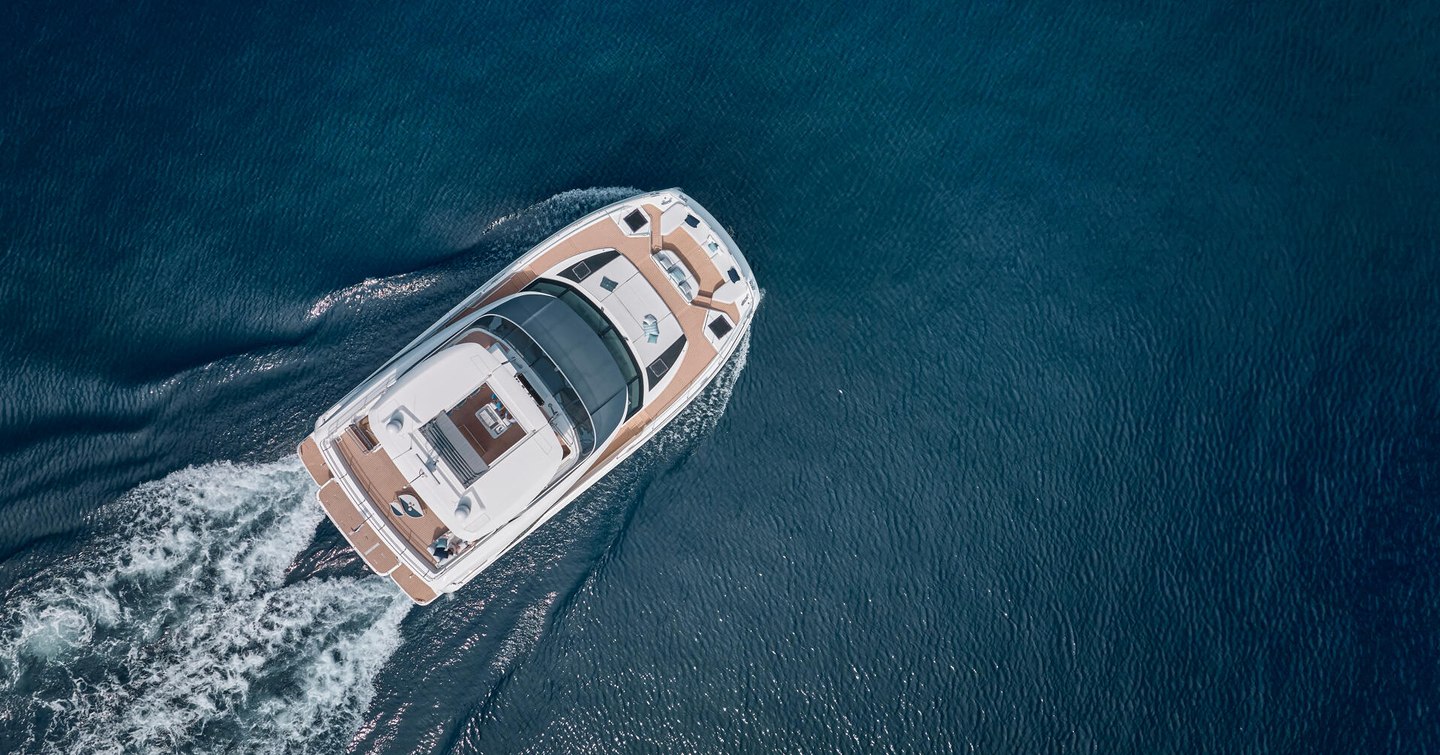
It's built at Beneteau Group Italia in Molfacone, originally tasked with constructing the now moth-balled Monte Carlo Yachts' boats. The upshot is, that this facility and its workforce are experienced in building more expensive yachts that are finished to a higher standard than the smaller stuff in the Beneteau Group stable. You see this all over the M8 but most obviously in the gauge and quality of the stainless steel, the grade of components (Tecma toilets and Miele galley appliances, for example), and eye-catching furniture designed in conjunction with Pininfarina. It's an expensive boat so the look and feel have to be right and, in general, it is. Especially if you're comparing it to an 85ft monohull as Prestige so often does.
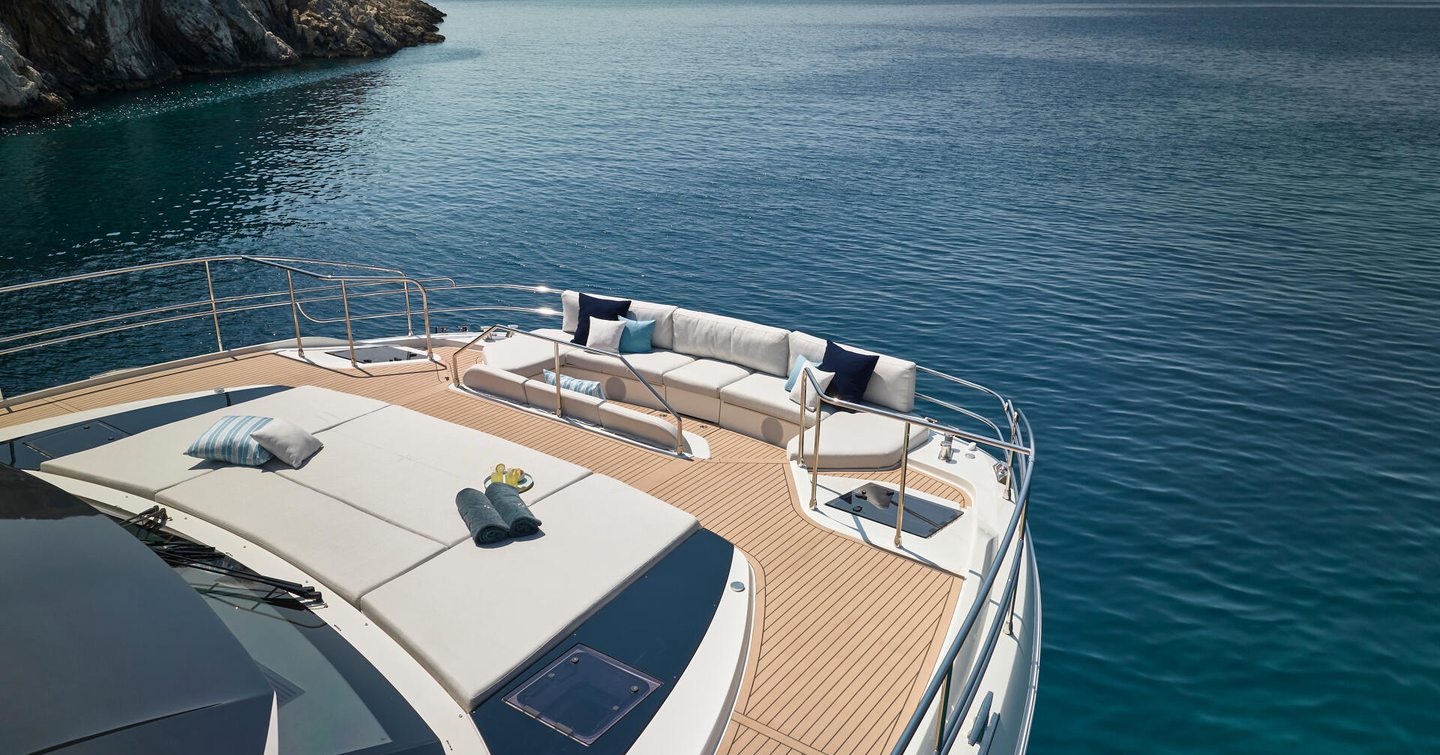
The Luxury of Space
The interior design is by Valentina Militerno de Romedis and it sets a fresh tone for a Prestige product. The mood board was centred around Miami and there's a beach house feel throughout. Light timbers and flooring are punctuated with bright pops of light blue in the dining chairs, scatter cushions and piping on the furniture. It's cool, clean and feels very different to any other Prestige I've been on. The luxury of space can create a dilemma (what do you fill it with?) but they've struck a great mix on the M8. They haven't filled the interior with furniture for the sake of it and have left plenty of open space to make moving around the boat very easy.
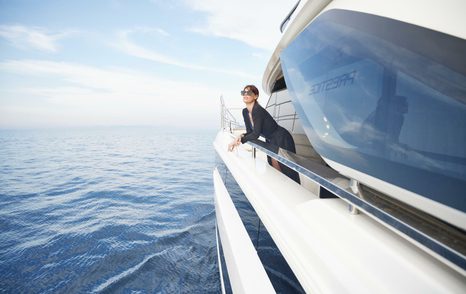
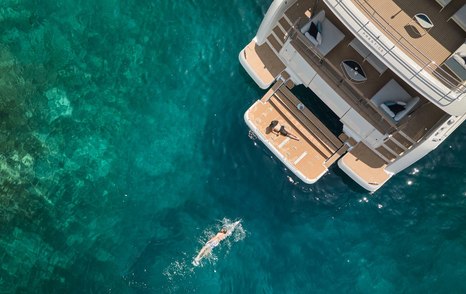
Marc Lombard was responsible for naval architecture, a man with plenty of experience drawing catamarans, and importantly, here, was designing a motor cat from the beginning. No amending an existing sailing cat design here and that has a positive effect on both the dynamics and the use of space on board. Beds are no longer poked into the corners of the hull, the modern power cat uses its interior space in a much more intelligent way.
One possibly unseen benefit of a multi-hull is the amount of space in, and access to, machinery spaces. The engines get an engine room to themselves so access to all sides is outstanding and there's so much headroom in the's that they can, as an option, build a floor and add another crew cabin here if requested. The finish was a little sloppy in darker corners but this is hull number one and there were still quite a few revisions that the yard wanted to make before final production.
With a nearly 9m (30ft) beam it won't shock you to learn that the M8's saloon is vast. The designers always had a forward galley in mind, to make the most of the connection between interior and exterior but the way they've worked a bar into the threshold between the two spaces is brilliant. It both gives you a space to serve guests without having to go to the galley and sensibly divides the beam so you don't have to wrestle with two enormous sliding doors. It includes an electric window that drops down to create a bar that faces out to the cockpit.
Access points to the saloon are excellent. Two doors aft, a sliding door to starboard on the aft side, and a side door to port adjacent to the dining table. With two staircases leading between the main deck and flybridge as well, moving around the boat couldn't be easier. The saloon has a grown-up feel with its relaxed free-standing furniture and the exposed stainless steel structure that is so elegantly integrated into the space. The aft end of the saloon is given over entirely over to lounging space with a mix of sofas and armchairs and a TV that swings down from the ceiling and swivels on its mount to face different parts of the space. Forward, the dining table is to port with neatly integrated storage for crockery and glassware in the unit beneath the windscreen. The door out onto the port side deck allows a natural breeze to draw into this area, though it is on the opposite side of the deck to the lower helm (if specified).
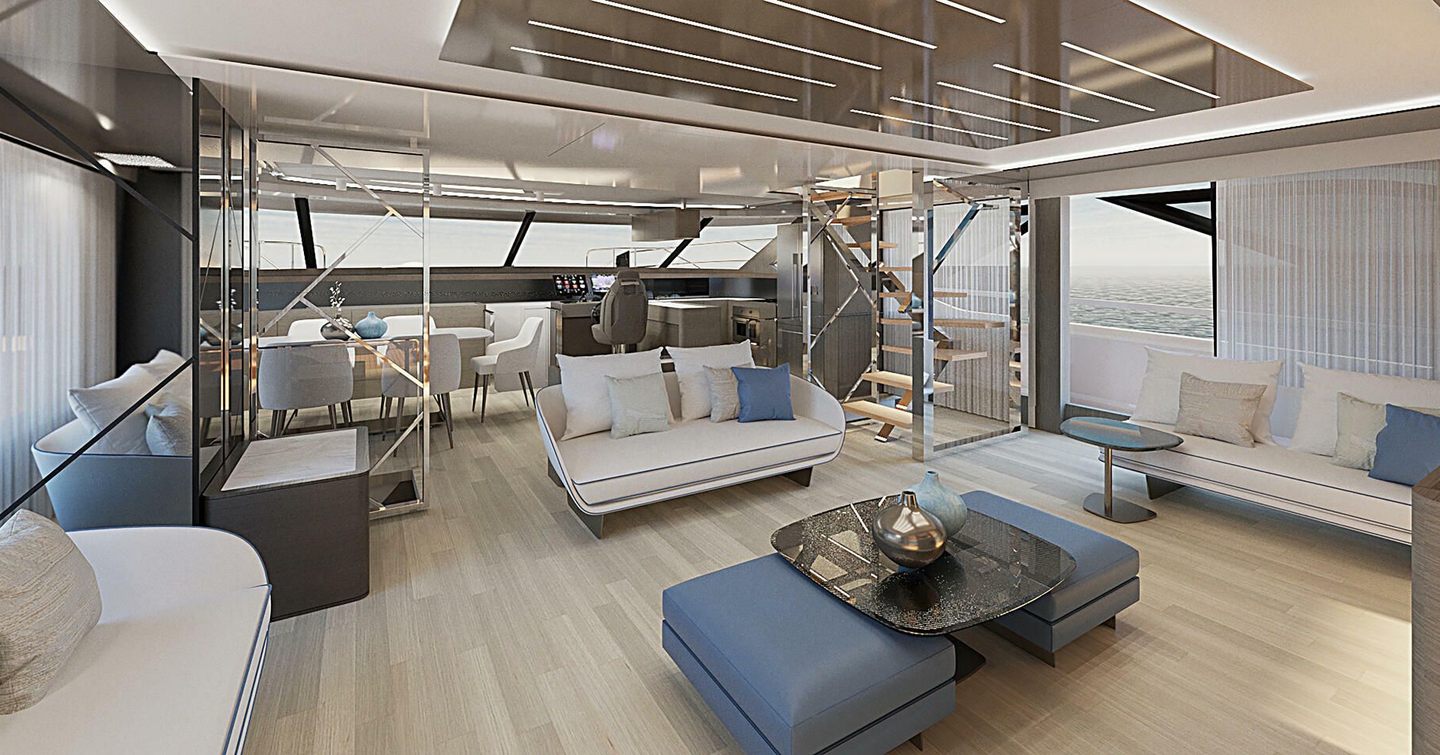

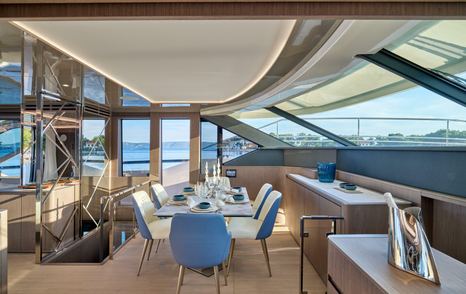
The galley feels a touch on the small side for a boat of this size but there are some pleasing additions, like the pop-up section of the counter designed specifically to hold a coffee machine, high-end Miele cooking appliances, and a truly enormous American-style fridge freezer. The dishwasher is on the small side to cope with all the washing up if the boat is full, however.
Between the galley and dining table, a large hatch in the floor lifts up to reveal a deep storage void complete with shelving and space for the washing machine and tumble dryer. Arguably not quite as convenient as having them located in one of the lobbies in the accommodation but having them centrally does mean it's easy for everyone on board to get to them. Whether the crew will appreciate sorting laundry in full view of guests in the middle of the saloon is another matter.
On that note, crew the cabins are located on the forepeaks of both hulls. It's the same idea as the M48 only much more spacious and generously equipped. The ladder access down into them isn't all that convenient but the space inside isn't too bad and they have their own ensuite bathrooms. It's worth pointing out that one crew cabin is standard and it's around €UR 22,000 to add the other one. They certainly aren't as luxurious as the crew space on your average 26m (85ft) monohull but then this type of boat is less likely to run with crew.
Internal staircases have fallen out of fashion in the monohull market but this is another feature that Prestige could afford to include on the M8 because there is the space to do it without compromising living space. It winds up to the top deck from the starboard side and is accessed via an electric sliding hatch, which draws back to link the decks. It's great for transporting food from the galley to the flybridge and for allowing the skipper to quickly dash between the helms without having to detour through the cockpit.
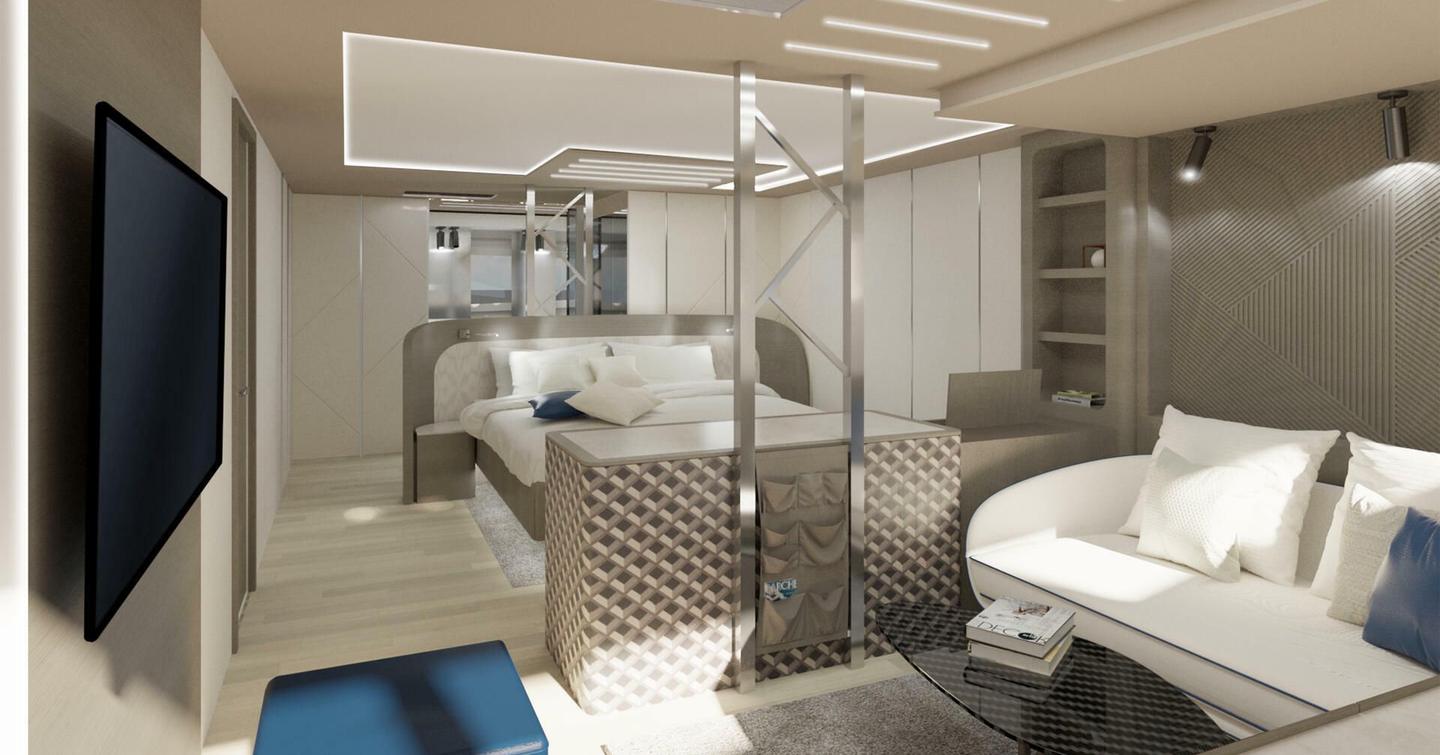
The 'Owner's Apartment'
Describing a cabin as the 'Owner's Apartment' does, on the face of it, sound like frightening marketing speak but it does feel rather accurate once inside. They talk of the space of an 85-footer and this cabin has just the sort of room you would expect to find on a monohull that size. It sprawls luxuriously across both hulls and incorporates a king-size bed, lounge/study, walk-in wardrobe, and a bathroom with separate shower and toilet cubicles.
It's lavish in its spaciousness and finished with panache. Again, the polished stainless structure makes an appearance but it's been cleverly used to separate the sleeping space from the lounge and you can specify a more solid partition if you'd rather have a private study or space for a cross-trainer to create a small gym.
The headroom is well over 6ft throughout and there is no dropping down into the hulls on either side as you might expect. The lounge and bathroom are set at the same level as the main part of the cabin so there are no steps — or any obstructions at all — to negotiate as you move around the accommodation.
The only real downside to the design is that there are no windows around the bed so the cabin relies quite heavily on the artificial lighting that is neatly integrated into the headlining. You don't feel as in touch with your surroundings because of the lack of windows but the space is undeniably impressive. What about guests, though?
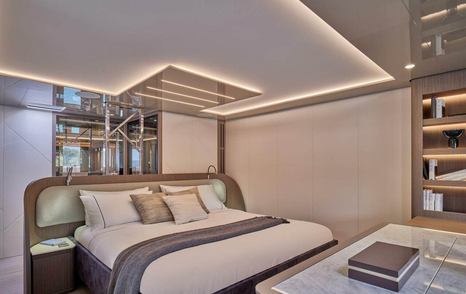

Guest accommodation is contained within the M8's hulls and there's a good degree of flexibility in the arrangements. You can opt to have the galley on the lower deck, which gobbles up space for a cabin and leaves more seating in its place on the main deck. Maybe if you're going to run the boat with crew, this would be an appealing arrangement so they can prepare food and drinks out of sight of guests but most owners will no doubt want the galley on deck and part of the action.
There is also a five-cabin option which could work well if the boat is destined for charter but the most popular layout will likely be what we had on the test boat, four cabins including the extended VIP on the port side. Here, the VIP cabin occupies almost the entire length of the port hull and as well as a large double bed, walk-in wardrobe, and private bathroom has a private lounge area with a pop-up TV. This gives those in the VIP their own little retreat away from other guests and creates a remarkably luxurious guest suite that could be considered a mini owner's cabin given its size and fit-out. In the five-cabin version, this cabin loses the seating area to create space for a cabin with a small double bed and a bunk.
In the opposite hull, there are two further guest cabins, one with a double bed and the other with a flexible arrangement which includes a large single/small double berth (depending on how you look at it) with a single bunk above. This would be a great cabin for kids but its flexible arrangement makes it a really handy cabin with a multitude of uses. It's nice that both of these cabins have their own bathrooms, too, so high levels of privacy are maintained.
There's less of an issue with natural light in these cabins than in the owner's suite because the beds all align with hull windows in a bid to make the most of the views out over the water when the boat is at anchor. It works well and the position of the beds with steps up either side means getting in and out of them is so much easier than if the beds are poked into the ends of the hulls.
There is no lower helm option as standard on the M8 but you can add a control station (€42,000) or fully fledged lower helm (€53,000). The boat we tested had the former and though it's not somewhere you would want to drive the boat from as it has no wheel and a basic dash layout, it does have a joystick and throttles and an MFD so you can check charts and the boat's position using the cameras. It's handy to have somewhere within the saloon that you have control from but the upgrade to the proper lower helm would be more useful, especially if there's any chance you'll be doing long passages at night. Often the view is restricted from the lower helm because of the height of the cabin in front but Prestige has skillfully avoided this with the M8.
For berthing, most will head to the cockpit and use the (optional) third docking station and unless the weather's truly miserable you'll want to be at the upper helm, which can be fully enclosed along with the rest of the flybridge thanks to a set of optional covers.
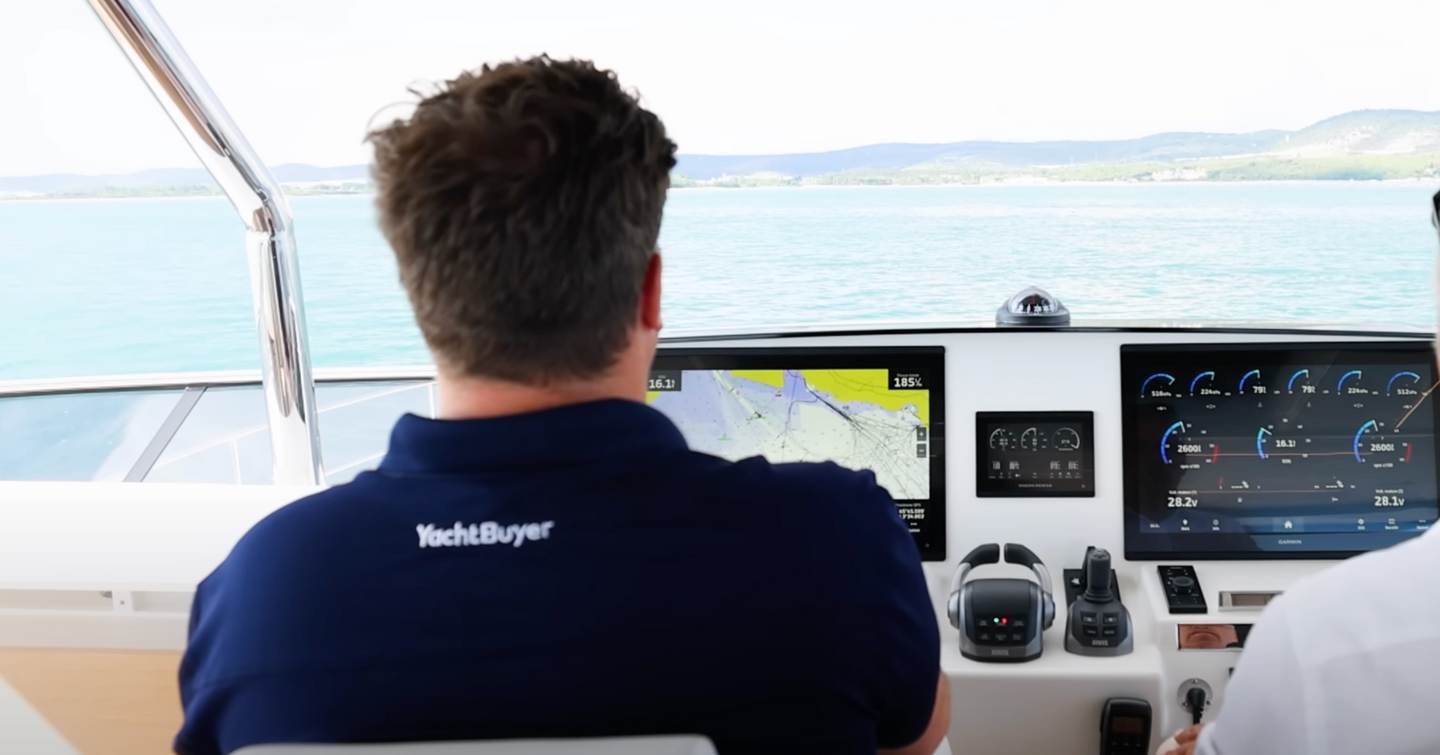


It's a great helm position perfectly tuned to the way the boat cruises. The chairs are high-backed and supportive with a good amount of adjustment and the dash itself is upright and clearly laid out. The 22in Garmin MFDs are standard and they are superb. Beautifully clear and capable of displaying multiple data feeds without the screens becoming confusing. There is also a smaller Volvo Penta screen that is dedicated to engine information so you can always keep an eye on that.
The throttles are a stretch if you sit back in the seat but this is not a boat where you interact constantly with the engine controls, it's very much a set-and-sit type of arrangement. Crucially, it's a very comfortable place to munch the miles and blissfully quiet, too.
The cockpit is, of course, enormous but Prestige has designed this area smartly to make the most of its prodigious width. The standout feature is the aft platform, which was designed exclusively by Opacmare for the M8 (that's the power of building boats in massive numbers).
It's a brilliant bit of tech and, in a pleasant surprise, comes as standard. It has various functions. It sinks into the water and with full-width integrated steps gives excellent access in and out for swimmers. It has a 500kg weight capacity so can launch/recover a decent tender and it also rises to deck level to create a mezzanine terrace in line with the cockpit.
The glass balustrade that runs across the transom opens up to complete the picture and create an Infiniti effect over the back deck. Completing the picture is the low-slung, comfy furniture which has the same sort of beach house feel as the seating inside the saloon.
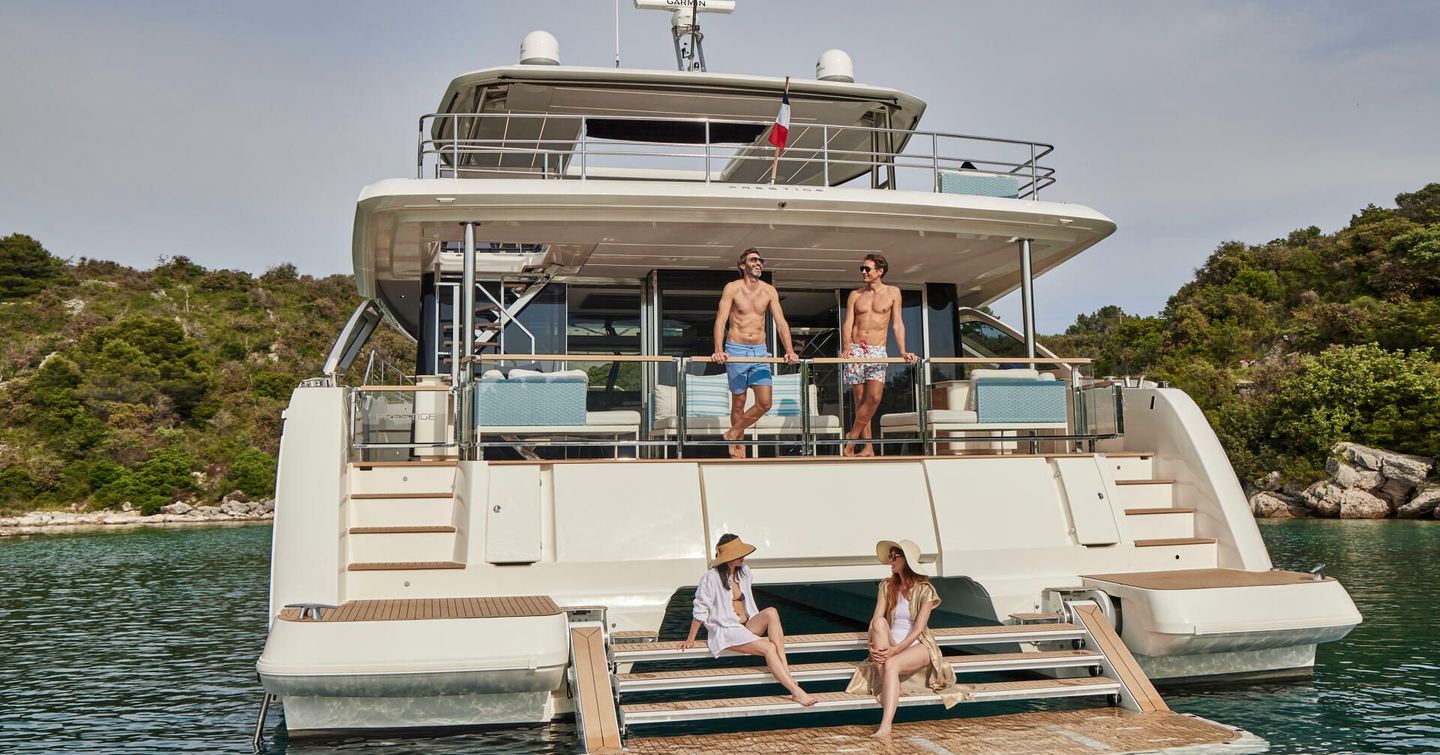
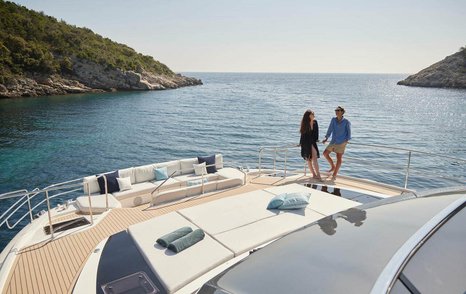
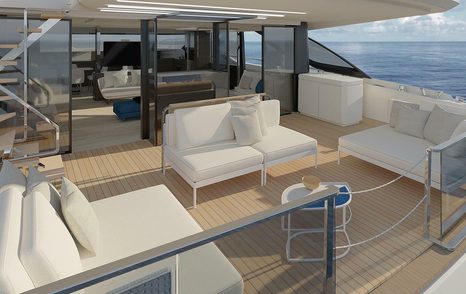
Beneath the deck, there is a vast storage void that can be accessed via a deck hatch or a door in the transom, which doubles up as a bench when teamed with the platform. This huge space is destined for water toys such as inflated SUPs and it's also deep enough to swallow most of the boat's fenders.
There isn't a huge amount to report about the starboard deck, apart from its width, but the port side has a feature that is a first for me on a boat of this size: a day head that can only be accessed from the deck. It makes perfect sense. It means that those in wet swimming gear or covered in sun cream don't need to go into the boat to use the toilet. A great bit of innovation, however, it's a shame it's a cost option.


Room To Breathe
Forward, the boat's width creates a natural living space that the designers have deftly moulded into a split sunbathing and seating area. The twin hulls allow a sunken moulding at the bow so you drop down between a pair of benches that put you right in the path of the breeze on a warm day. It's a lovely place to sit with the water swooshing past the slender hulls.
The flybridge comes as standard with an open aft end with the option to add lounge furniture for €34,000. That's a lot of money for some furniture but it finishes off this area well. Prestige has, once again, filled the space sensibly with a great mix of dining and sunbathing space and a split central wet bar that allows you to hold court while lining up the drinks or flipping a burger or two.
The hard top comes as standard but a canvas sunroof is an option (€14,000), as is Silent Mode, a €120,000 option that adds solar panels and a larger battery bank that allows you to run the boat overnight with all services running and not fire the generator. It helps, of course, that the boat doesn't have to run a stabilizer on anchor but Prestige has made efficiency improvements elsewhere, like using a gas-powered air-con system rather than chilled water, which uses one third less energy.
Value for money is a cornerstone of Beneteau Group's ethos but where does that sit when a product costs (correct at time of writing) €4,750,000 ex VAT? You can't judge it against a 70-foot monohull because the space on offer here is just so much greater. The boat also has an impressive standard specification, a lesson learned from the Monte Carlo Yachts brand that at this level customers expect a certain amount of kit to come as standard.
A crew cabin comes as standard, the hard top, the hydraulic bathing platform, synthetic teak in the cockpit, air-conditioning, the joystick, twin bow thrusters, a 22kW generator, twin 22in MFDs at the flybridge helm, and all of those high-end galley appliances such as the Miele cooking equipment and Fischer & Paykell double fridge.
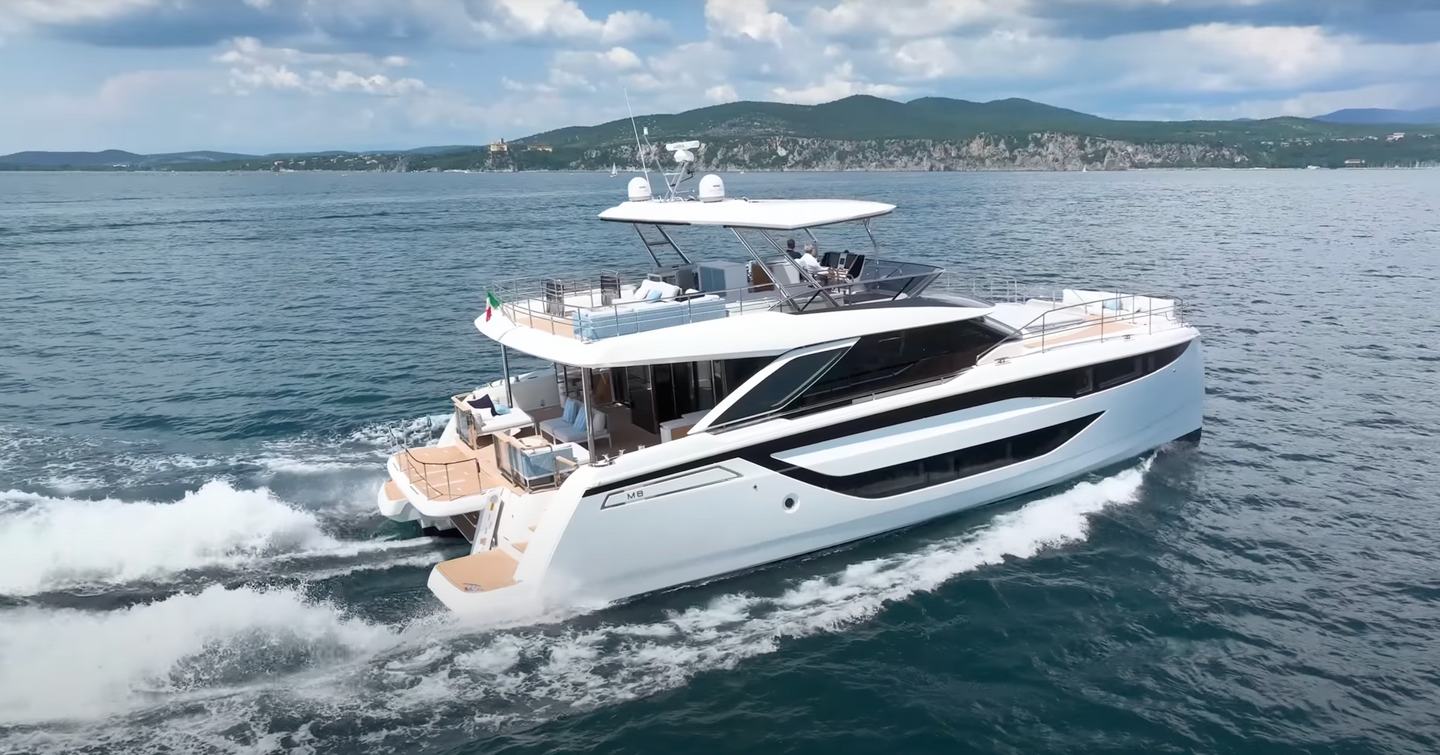
Our Options & Pick
The cost options you might want to add to that would include lounge seating on the flybridge, the lower helm, a passerelle (for the Med), the BBQ grill on the flybridge, the day head, the cockpit joystick, and the rearview camera, totalling around €190,000 of extras.
This sort of money pushes the M8 into yacht territory and the orbit of some big-hitting brands in both the monohull and multihull worlds. Buying the boat is one thing but due to the boat's width-to-length ratio, depending on where you keep it, there may be a premium pay for moorings as a resident and a visitor. That said, the boat is so well attuned to living on anchor that you may find the need to be in a marina isn't as acute as it would be on a similar-sized monohull.
Our Verdict
This is an impressive leap for Prestige in such a short space of time. A couple of years ago the brand had never built a multihull and now it has two in the stable including this impressive flagship. The beauty of the M8 is that it has multihull space with a look and feel of a production monohull. Creating this from the ground up as a power catamaran and not adapting an existing platform is what makes it such a successful piece of design. Yes, there are some rough edges that need addressing on hull number one, and no doubt they will be, but there is a lot to like here and this is a major line in the sand for Prestige as it looks to establish itself in a booming genre.
Reasons to Buy
- The space!
- Aft platform design
- Flexible layout
- Incredible owner's suite
- Ease of control
Things to Consider
- Cruising range isn't huge
- On the pricey side
- Compact crew accommodation
Looking to own a Prestige M8? Use YachtBuyer’s Market Watch to compare all new and used Prestige M8 Boats for sale worldwide. You can also order a new Prestige M8, customized to your exact specifications, with options for engine choice and layout configuration. Alternatively, explore our global listings of new and used boats for sale and find your perfect boat today!
Rivals to Consider
For what was once seen as a niche genre, the big power cat market is gaining momentum as is clear from the impressive list of rivals that the M8 faces.
Built on the French Atlantic coast, the Power 67 was an equal leap into the big league for Fountaine Pajot as the M8 is for Prestige. FP has an excellent reputation in building large sailing catamarans but expectations are different when building a motor cat of this size and price. Like the Prestige, it has a very flexible interior layout though it doesn't boast the full-beam owner's suite of the M8 and instead opts for an extended cabin in the starboard hull. It too is available with four or five cabins. The cabins may not be quite as impressive but the main deck has a real wow factor because you can access the foredeck directly from the saloon where, as an option, you can specify a hot tub for a slice of the superyacht life. It runs a pair of relatively small 480hp Volvo Penta engines but it's a light boat so the top speed is still just shy of 20 knots and it will cover over 1,000nm at 10 knots.
The Horizon PC68 is a more traditional power cat design from the highly experienced Tawainese shipyard. High-quality engineering and customisation come as standard with Horizon products, so even though the 68 doesn't have the layout flexibility of the M8 and isn't available with five cabins, there is still plenty of scope to make the boat your own. It's available with an open or enclosed flybridge deck and the latter is a full enclosure with an upper lounge and sun deck. It's a more reserved design both in style and features so it doesn't have the functionality of the M8 but it's a classy operator that bristles with quality touches. The main deck focuses on a large family kitchen - almost twice the size of the M8's - complete with a four-person breakfast bar. The owner's suite is forward in the main deck and has its bed positioned on the centre line with its ensuite down to port. Twin MAN i8 650hp engines should offer similar performance and range to the Prestige, though with almost twice the fuel capacity the Horizon's range should be superior.
The 60 Sunreef Power is slightly shorter than the M8 but, staggeringly, it's almost 2m wider and this translates to over 843 square feet of living space on board. The Polish yard has pushed to extremes when it comes to finding space on board this boat, to the extent that you can have it with four, five or six cabins. It's a slick and super modern design that looks bang up to date, though it doesn't have the warmth in its interior of the rivals above. The space is just mighty, though, and there are some big boat additions like the entrance out onto the foredeck from the saloon and the option to have a hot tub on the flybridge. Sunreef is open to customisation, too, and some boats have, for example, replaced a cabin with a fully custom gym. It's not just some floating beach club, though, the standard fuel capacity is 6,000 litres but you can boost that to 10,000 litres for true globetrotting range.
The Aquila 70 is a classy customer which, if you're changing from a high-end monohull, has the quality look and feel to match. It too has a flexible layout but its saloon layout has a real home-from-home luxury apartment feel to it. The enclosed flybridge with an aft deck doesn't have anywhere near the space of the M8's but having a fully protected, climate-controlled upper deck will suit some markets and cruising styles more than the Prestige's open fly. There isn't a five-cabin option but you can have four if you sacrifice the crew space and whichever arrangement you go for, the owner's suite is full-beam forward and it's a lovely space. Not single-level like the Prestige's but still a mega cabin for this length of boat. Its performance is more flexible than the M8's because with its twin 1,000hp Volvo Penta D13s it will hit 27 knots flat out and cruise 450nm at a 20-knot cruise. It's one of the most cohesive packages in the sector.
Considering a new boat? Explore Prestige's entire current range to find the model that best suits your needs, and compare it with alternatives from competitors to ensure you make the perfect choice.
Specifications & Performance
- Builder Prestige
- Range M-Line
- Model M8
- Length Overall 19.82m
- Beam 8.85m
- Draft 1.65m
- Hull GRP
- Cabins 5
- Berths 6
- Crew 2
- Cruising Speed
- Max Speed
- Fuel Capacity 3,700 Litres
- Fresh Water Capacity 850 Litres
- Engine Model 2x Volvo Penta D8-600
- Engine max range (speed type) 350 (nm)
Performance Data
Prestige M8 version 2023. *Data collected by Yacht Buyer during testing.
Test Engines Twin Volvo Penta D8-600
- RPM
- Knots
- Liters Per Hour
- Liters Per Mile
- Range (nm)
- Decibels
-
- 1,000
- 6.6
- 12
- 2
- 2,123
- -
-
- ECO
- 1,250
- 8.2
- 21
- 3
- 1,431
- -
-
- 1,500
- 9.7
- 37
- 4
- 983
- -
-
- 1,750
- 10.7
- 55
- 5
- 720
- -
-
- 2,000
- 11.4
- 87
- 8
- 485
- -
-
- 2,250
- 12.2
- 130
- 11
- 347
- -
-
- 2,500
- 14.3
- 168
- 12
- 308
- -
-
- CRUISE
- 2,750
- 17.7
- 208
- 12
- 315
- -
-
- MAX
- 2,950
- 20.3
- 241
- 12
- 307
- -
Interested in a M8?
NEW Build
Find your local dealer for a personalised, no-cost consultation
or just request
Brochures & Pricing
Used & In Stock
Looking for a ready-to-go M8 or pre-owned options? Explore all inventory of the M8 available worldwide
